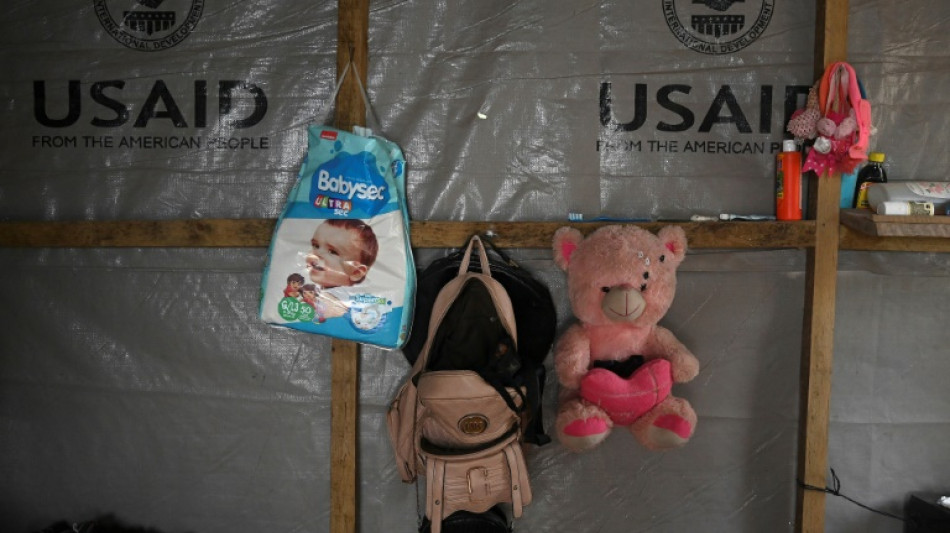
-
 Trump unveils fast-track visas for World Cup ticket holders
Trump unveils fast-track visas for World Cup ticket holders
-
Netherlands qualify for World Cup, Poland in play-offs

-
 Germany crush Slovakia to qualify for 2026 World Cup
Germany crush Slovakia to qualify for 2026 World Cup
-
'In it to win it': Australia doubles down on climate hosting bid

-
 Former NFL star Brown could face 30 yrs jail for shooting case: prosecutor
Former NFL star Brown could face 30 yrs jail for shooting case: prosecutor
-
Fate of Canada government hinges on tight budget vote

-
 New research measures how much plastic is lethal for marine life
New research measures how much plastic is lethal for marine life
-
Mbappe, PSG face off in multi-million lawsuit

-
 EU defends carbon tax as ministers take over COP30 negotiations
EU defends carbon tax as ministers take over COP30 negotiations
-
McCartney to release silent AI protest song

-
 Louvre shuts gallery over ceiling safety fears
Louvre shuts gallery over ceiling safety fears
-
'Stranded, stressed' giraffes in Kenya relocated as habitats encroached

-
 US Supreme Court to hear migrant asylum claim case
US Supreme Court to hear migrant asylum claim case
-
Western aid cuts could cause 22.6 million deaths, researchers say

-
 Clarke hails Scotland 'legends' ahead of crunch World Cup qualifier
Clarke hails Scotland 'legends' ahead of crunch World Cup qualifier
-
S.Africa says 'suspicious' flights from Israel show 'agenda to cleanse Palestinians'

-
 South Korea pledges to phase out coal plants at COP30
South Korea pledges to phase out coal plants at COP30
-
Ex-PSG footballer Hamraoui claims 3.5m euros damages against club

-
 Mbappe, PSG in counterclaims worth hundreds of millions
Mbappe, PSG in counterclaims worth hundreds of millions
-
Two newly discovered Bach organ works unveiled in Germany

-
 Stocks lower on uncertainty over earnings, tech rally, US rates
Stocks lower on uncertainty over earnings, tech rally, US rates
-
Barca to make long-awaited Camp Nou return on November 22

-
 COP30 talks enter homestretch with UN warning against 'stonewalling'
COP30 talks enter homestretch with UN warning against 'stonewalling'
-
France makes 'historic' accord to sell Ukraine 100 warplanes

-
 Delhi car bombing accused appears in Indian court, another suspect held
Delhi car bombing accused appears in Indian court, another suspect held
-
Emirates orders 65 more Boeing 777X planes despite delays

-
 Ex-champion Joshua to fight YouTube star Jake Paul
Ex-champion Joshua to fight YouTube star Jake Paul
-
Bangladesh court sentences ex-PM to be hanged for crimes against humanity

-
 Trade tensions force EU to cut 2026 eurozone growth forecast
Trade tensions force EU to cut 2026 eurozone growth forecast
-
'Killed without knowing why': Sudanese exiles relive Darfur's past

-
 Stocks lower on uncertainty over tech rally, US rates
Stocks lower on uncertainty over tech rally, US rates
-
Death toll from Indonesia landslides rises to 18

-
 Macron, Zelensky sign accord for Ukraine to buy French fighter jets
Macron, Zelensky sign accord for Ukraine to buy French fighter jets
-
India Delhi car bomb accused appears in court

-
 Leftist, far-right candidates advance to Chilean presidential run-off
Leftist, far-right candidates advance to Chilean presidential run-off
-
Bangladesh's Hasina: from PM to crimes against humanity convict

-
 Rugby chiefs unveil 'watershed' Nations Championship
Rugby chiefs unveil 'watershed' Nations Championship
-
EU predicts less eurozone 2026 growth due to trade tensions

-
 Swiss growth suffered from US tariffs in Q3: data
Swiss growth suffered from US tariffs in Q3: data
-
Bangladesh ex-PM sentenced to death for crimes against humanity

-
 Singapore jails 'attention seeking' Australian over Ariana Grande incident
Singapore jails 'attention seeking' Australian over Ariana Grande incident
-
Tom Cruise receives honorary Oscar for illustrious career

-
 Fury in China over Japan PM's Taiwan comments
Fury in China over Japan PM's Taiwan comments
-
Carbon capture promoters turn up in numbers at COP30: NGO

-
 Japan-China spat over Taiwan comments sinks tourism stocks
Japan-China spat over Taiwan comments sinks tourism stocks
-
No Wemby, no Castle, no problem as NBA Spurs rip Kings

-
 In reversal, Trump supports House vote to release Epstein files
In reversal, Trump supports House vote to release Epstein files
-
Gauff-led holders USA to face Spain, Argentina at United Cup

-
 Ecuador voters reject return of US military bases
Ecuador voters reject return of US military bases
-
Bodyline and Bradman to Botham and Stokes: five great Ashes series


Western aid cuts could cause 22.6 million deaths, researchers say
More than 22 million people, many of them children, could die preventable deaths by 2030 due to aid cuts by the United States and European countries, new research said Monday.
The findings are an update of a study earlier this year that said President Donald Trump's sweeping reductions in assistance, including the dismantling the US Agency for International Development (USAID), could lead to 14 million additional deaths.
The new research, seen by AFP, takes into account reductions in all official development assistance as Britain, France and Germany also slash their aid to the developing world.
"It is the first time in the last 30 years that France, Germany, the United Kingdom and the United States are all cutting aid at the same time," said one of the new research's authors, Gonzalo Fanjul, policy and development director at the Barcelona Institute for Global Health (ISGlobal).
"The European countries do not compare with the US, but when you combine all of them, the blow to the global aid system is extraordinary. It's absolutely unprecedented," he told AFP.
The research by authors from Spain, Brazil and Mozambique was submitted Monday to The Lancet Global Health and is awaiting peer review.
The research is based off data on how aid in the past has reduced deaths, especially in preventable areas such as HIV/AIDS, malaria and tuberculosis.
In a scenario in which aid cuts turn out to be severe, the new research expects 22.6 million excess deaths by 2030, including 5.4 million children under the age of five.
The researchers gave a range of 16.3-29.3 million deaths to account for uncertainties, including which programs will be cut and whether there are external shocks such as wars, economic downturns or climate-related disasters.
A milder defunding scenario would see 9.4 million excess deaths, the research said.
- Major donors cut at once -
Trump, in a cost-cutting spree advised by the world's richest person Elon Musk, soon after taking office slashed foreign assistance by more than 80 percent and shut down USAID, which was the world's largest aid agency and handled $35 billion in the 2024 fiscal year.
Secretary of State Marco Rubio said that aid did not serve core US interests, pointing in part to how aid recipient nations have voted against the United States at the United Nations, and called instead for assistance with clear and narrow aims.
Testifying before Congress, Rubio denied any deaths from US aid cuts and accused critics of being beneficiaries of an "NGO industrial complex."
Instead of seeking to fill the gap, Britain, France and Germany have also cut aid owing to budgetary pressure at home and decisions to focus more on defense spending following Russia's invasion of Ukraine.
Among top donors of official development assistance, only Japan's assistance has remained relatively steady over the past two years.
Beyond the immediate ends to projects, the study said that cuts would have knock-on effects by tearing down institutional capacities "painstakingly built over decades of international cooperation."
Fanjul acknowledged a need for countries to transition from the existing setup, especially their reliance on international HIV/AIDS funding.
"The problem has been the speed and the brutality of the process. In six months, we are experiencing a process that should have taken over a decade" or more, he said.
Davide Rasella, the principal investigator on the latest research, put aid budgets in comparison by noting that the Trump administration has promised $20 billion to prop up Argentina.
"In the world context these amounts of money are nothing huge," Rasella said.
Policymakers "change budgets and they really have no perception how many lives are at stake," he said.
The research was funded by the Rockefeller Foundation and Spain's science ministry.
A Rockefeller Foundation spokesperson said the New York-based philanthropy will "look forward to the publication of the peer-reviewed numbers, which will make even clearer the human cost of inaction and the profound opportunity we have to save lives."
"This data is an urgent alarm for the world."
O.Schlaepfer--VB
